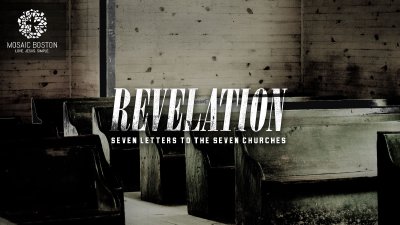


Revelation: Seven Letters to the Seven Churches
A Letter to Ephesus
June 5, 2016 • Revelation 2:1–7
Today we begin a new sermon series at Mosaic through Jesus' seven letters to the seven churches in Revelation chapters 2 and 3. The incredible unvoiced assumption behind these letters, is that just as much as Jesus Christ loves and cares for the universal Church, he loves and cares for particular churches. As the Apostle John gazes at the glorious Christ in Revelation 1, Jesus turns John's gaze to seven individual churches. The more we love Jesus, the more we love what Jesus loves, and Jesus loves his churches. The deeper our commitment to Jesus, the deeper our commitment to what he's committed to: his Church. Each letter, addressed to each of the individual churches, begins with the phrase: "I know...". Jesus writes, "I know your works..."; "I know you are enduring patiently..."; "I know your tribulation..."; "I know where you dwell..."; "I know your love and your faith...". Jesus is paying incredibly close attention to his churches. This is simultaneously a great comfort when we feel that no one notices our service, and also a great invitation to reassess our own heart toward the Lord and his Church. Join us as we look at Jesus' first letter to the church in Ephesus.
A Letter to Smyrna
June 12, 2016 • Revelation 2:8–11
Throughout church history, Christians have been persecuted for simply remaining faithful to Jesus Christ. Though we enjoy relative religious freedom, Christians worldwide are continuing to suffer for their faith. Several watchdog organizations have published papers saying that "2015 was the worst year in modern history for Christian persecution." With North Korea leading the way, and militant radical Islam rapidly expanding, today is one of the most dangerous times ever to be a Christian. The Christian persecution watchdog "Open Doors" has released a statistic recently stating that, today, a Christian is martyred for their faith every 5 minutes. More Christians have been martyred in the 20th and 21st centuries, than all the previous 19 combined. Though we might not be martyred for our faith in this country, the political and cultural landscape is certainly making it more difficult to publicly proclaim the name of Christ and his teachings. Our culture seems to be tolerant toward everyone, except Christians. However, we need not be afraid. Jesus actually told us that persecution can be a blessing: "Blessed are you when others revile and prosecute you for righteousness' sake, for theirs is the kingdom of heaven." We need to learn from the early church in how they remained faithful to the Lord despite persecution. Join us today as we look at Jesus' 2nd letter to the church in Smyrna.
A Letter to Pergamum
June 19, 2016 • Revelation 2:12–17
A.W. Tozer once said: "A new Decalogue has been adopted by the neo-christians of our day, 'Thou shalt not disagree,' and a new set of Beatitudes too, 'Blessed are they that tolerate everything for they shall not be made accountable.'" These words seem to be truer than ever. Our culture appears to be putting more and more pressure on the Church to conform to the prevailing culture's values. To conform to the culture, the Church is pressured to compromise both theologically and morally. In a seemingly noble desire to accommodate the culture, the church begins to compromise the truth. Once the truth is compromised, morality follows suit. Idolatry and sexual immorality always go hand in hand--spiritual infidelity and sexual infidelity are bedmates. Eventually, compromise renders the witness of the Church null and void. Though the pressure comes from outside the church, the decision to compromise always comes from within. One small compromise here and one small compromise there, and before you know it, a church is disseminating full-blown heresy and living in absolute apostasy. Unfortunately, this has been the sad story of many a church in Boston. It's imperative that we learn from the early church in how to withstand the pressures to conform to this world, by continually being transformed by God's Word. Join us today as we look at Jesus' 3rd letter to the church in Pergamum.
A Letter to Thyatira
June 26, 2016 • Shane Sikkema
Are you a tolerant person? It’s a questions we’ve all either asked, or been asked. If you’ve asked that question, you were probably curious to know if the person, or people, you were addressing could love you if they really knew your beliefs or lifestyle. If you’ve been asked that question, you may have worried that you were about to be ambushed. Sometimes the real question behind the question is, “do you agree with me, because if not then I’m not going to tolerate you!” Part of our struggle with this popular question, is that our culture has redefined tolerance, and forgotten why it could be good in the first place. I say “could” be good, because the Bible assumes there are times when tolerance is actually not good. It’s possible for tolerance to be unloving. It’s even possible for tolerance to be a facade to a subtle form of hatred, a cover up for indifference. Today we will be looking at Jesus letter to the church in Thyatira. The letter is perplexing, but also enlightening because we see Jesus commending the church for their love, while also condemning them for their tolerance. How can tolerance be bad? When do love and tolerance need to part ways? Is there a more compelling goal than tolerance, that our culture should be pursuing? These are some of the questions we’ll wrestle with today as we look at the next letter in our series on the Seven Churches of Revelation.
A Letter to Philadelphia
July 10, 2016 • Revelation 3
"Who can make it stop?" This was CNN's headline this morning. After living through another blood-soaked, tear-filled, gut-wrenching week, I think many of us are asking the same heavy question. It's a question that acknowledges our helplessness. It's a question that realizes we are faced with problems greater than even our collective resources can solve. It's a question that longs for someone powerful enough to intervene. Who can make the hate stop? Who can make the racism stop? Who can make the injustice stop? Who can make it stop? Profound question. It's a question that erupts out of brokenness, anguish, and humility. I can't make it stop. You can't make it stop. Even we, can't make it stop. Who can make it stop? Jesus Christ can make it stop. "I know that you have but little power," say Jesus to the church of Philadelphia in Revelation 3, and to us. But fret not, he says. "I am the one who holds the keys to all the doors. The doors I open, no one will shut, and the doors I shut, no one will open." Join us today as we cry out to Jesus to make it stop. To close the doors of hate, racism, and injustice, and to open the doors of love, reconciliation, and justice.
A Letter to Laodicea
July 17, 2016 • Shane Sikkema
How do you measure success? What does a great life look like? Most people would measure success by wealth, power, comfort, popularity… but how does Jesus measure success? This week we conclude our series on the 7 letters to the 7 churches in Revelation by looking at Jesus’ letter to the church in Laodicea. The Christians in Laodicea were physically healthy, economically secure, and socially accepted. They had all the outward signs of success, but spiritually they were failing. In fact, Jesus had absolutely nothing positive to say about them as a church. So where did they go wrong? Despite their failures, Jesus hadn’t given up on Laodicea. In fact, He counsels them on how to turn things around and become everything He had called them to be. Join us today as we study this church, and learn what it means to have a successful life in Christ.


